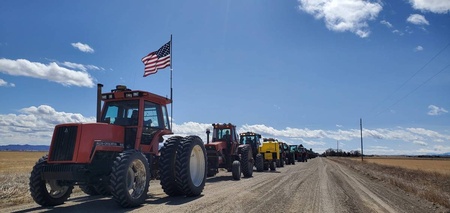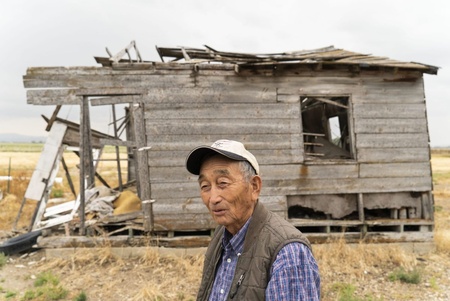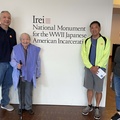As far as the eye could see along Road 90 where it meets Lane 9, stretching along the vast dusty farmland of Powell, Wyoming, and extending for miles in the shadow of Heart Mountain, 60 tractors paraded by the homestead farm that Tak Ogawa tended and nurtured for more than 70 years. The procession of farmers came to pay tribute to the man they knew as a pioneer, neighbor, co-worker, helper and friend.
On March 31, Ogawa passed away quietly at the age of 96, just as the sun was rising and most likely around the time he was usually heading out to plow the fields. The oldest working homesteader out of 215 veterans who were awarded homesteads after the war, Tak faithfully toiled the fields with one of his John Deere tractors until the age of 93. After his wife Emmy died a decade ago, he readjusted to a solitary farming life without her by his side. With typical humility, Tak used to say that there was nothing else he knew how to do and, perhaps more accurately, that his life would be empty without it.
I met Tak in 1994 when I volunteered to help move two barracks from the former site of the Heart Mountain camp to the Japanese American National Museum, where one barrack still greets visitors at the entry to its permanent exhibition. Tak graciously donated a part of the only barrack he received as part of his homesteader allotment, a ramshackle building that held many bleak memories for those once forced to live in them and later provided sparse shelter for incoming homesteaders. The whitewashed 20-by-40-foot segment that Tak used for a storage shed was discovered by former Heart Mountain incarceree Bacon Sakatani, who befriended Tak and arranged for its transfer.
I have vivid memories of meeting the lanky Japanese American farmer for the first time more than 25 years ago. He stood out in his overalls looking comfortably at home in Wyoming. In contrast, we were a bunch of city folk, a group of 30 volunteers that included former Heart Mountain nisei who had agreed to go back to this dirty and desolate place that had once been frighteningly unfamiliar to them but that Tak had come to know intimately.
An Idaho native, Tak escaped incarceration because he lived outside the military zone and became the only Japanese American to be awarded a homestead at a time when the area was still reeling from the nearby detention center that held as many as 11,000 Japanese Americans. As an Army veteran who was first turned away from the Navy when he tried to enlist in 1941, and later drafted in 1944 to serve at Fort Bliss, Texas, until 1946, his military service qualified him to receive 114 acres and a barrack.
Following up on an advertisement in the newspaper about the Wyoming lottery. Ogawa, then a bachelor, was given priority number 53 out of 1,839 applicants, and drew one of 104 available farm units in the final drawing.
When photographer Stan Honda and I went back to Wyoming in 2016, to work on our updated book and film project, “Moving Walls,” we found Tak coming home from another hard day’s work after having endured a protracted hospital stay for a heart condition a few months earlier. Appearing as robust as ever at age 90, he talked about retiring but somehow you knew it wasn’t going to happen, at least not as long as he had an ounce of sweat left in him.
He claims he would never have made it through the harsh Wyoming winters had he not found ways to increase his acreage, at times working for other landlords to help get by. As was true for so many of the homesteaders, he soon became aware that you couldn’t survive on a little more than 100 acres, so he eventually grew to farming 1,500 acres over a period of 20 years. As he grew older and his body less agile, he was happy that part of his land was being farmed by neighbors who helped him with the heavy work in exchange for his lending them his tractors, necessary though costly tools to help turn a profit.
Tak was never “just” a farmer, as he would like to call himself, but he embodied all the qualities that make farming more than another humble profession. He gained the respect of all his farming neighbors by quietly doing his work and frequently helping them do theirs if they needed him. You could always find Tak out in the fields—severe Wyoming weather permitting—and I would venture to guess that when harvest season rolls around, Tak’s spirit can still be seen out there atop his trusty John Deere—only to disappear among the congregation of faithful farmers that rode by to say farewell to their dear friend one last time.
* This article was originally published in The Rafu Shimpo on April 30, 2022.
© 2022 Sharon Yamato







